Without Religious Freedom, Democracy is Impossible: Summary of the Round Table at UCU
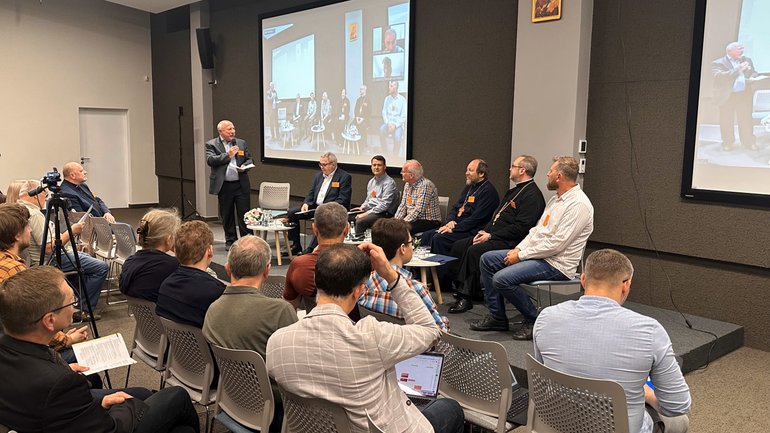
This event began the international scientific conference "Church Diplomacy and the Religious Dimension of the Russian-Ukrainian War" on June 29-30 at the Ukrainian Catholic University (UCU).
The conference was organized as part of a joint research project between the Institute of Church History at UCU and the Nanovic Institute for European Studies at the University of Notre Dame (USA). It brought together scholars from Ukraine, the USA, Poland, Germany, Switzerland, Austria, and Israel.
According to Clemens Sedmak, the director of the Nanovic Institute for European Studies at the University of Notre Dame, it is essential to understand religions and religiosity. Religion holds significance and impacts matters concerning human identity, duty, and our judgments. Investigating religion and religiosity is particularly crucial during the war with Russia, as it is a conflict where Christians are killing Christians. Church diplomacy, in particular, plays a significant role in resolving complex situations.
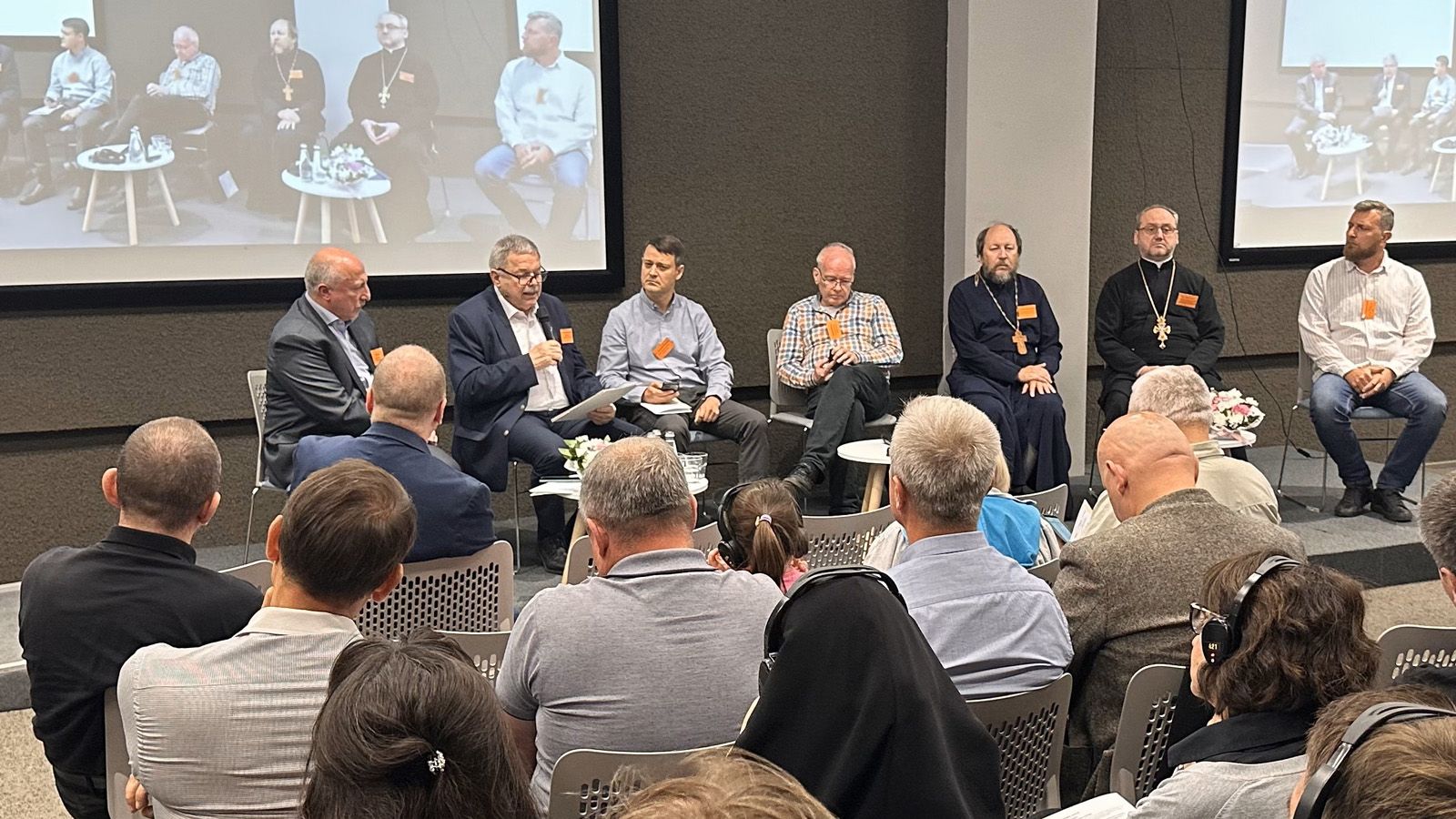
Myroslav Marynovych, the Vice-Rector of UCU, a dissident, and a religious scholar highlights that one of the current critical challenges is balancing the protection of national security while preserving religious freedom:
"We are faced with an epic task: How to find a way to navigate between Scylla and Charybdis? On the one hand, the danger lies in ignoring all the secretive and sometimes overt damage caused to Ukraine by certain hierarchs of the UOC-MP (Ukrainian Orthodox Church of the Moscow Patriarchate) and active adherents of the 'Russian world.' In doing so, national security may suffer in times of war. On the other hand, we risk violating religious freedom, a fundamental characteristic of democracy. In defending democracy, we might inadvertently destroy it."
According to him, the hierarchy of the UOC-MP (Ukrainian Orthodox Church of the Moscow Patriarchate) has been accustomed to living with a sense of legal immunity, as any attempt to touch their interests was interpreted as persecution of the Church. The world was willing to accept this as the truth. Meanwhile, Ukrainian authorities preferred not to challenge the UOC-MP. Consequently, the clergy of this Church operated seemingly outside the scope of Ukrainian legislation.
"In the conditions of full-scale war, the situation became outrageous. The clergy of this Church propagated informational messages from the aggressor state, accused Ukraine of the war, collaborated with the enemy, engaged in espionage activities, passed military information to the enemy, and even concealed weapons in churches. The imperial ideology of the 'Russian world' completely replaced the Church's doctrine and became a shield behind which anti-state activities were conducted. For me, the litmus test was the refusal of the UOC-MP clergy to sing requiems for fallen Ukrainian soldiers. This seemed to illustrate that they are not representatives of Ukrainian Orthodoxy in the Moscow Patriarchate but rather representatives of Russian Orthodoxy in Ukraine. This changes our perception of them," adds Mr. Myroslav.
Due to this situation, 66% of Ukrainians (according to the Kyiv International Institute of Sociology survey) believe that the activities of the UOC-MP should be banned. Some local self-government has decided to ban it, but it is beyond their powers. Moreover, churches in Ukraine are not legal entities, so according to the legislation, it is impossible to ban them (only the activities of specific religious communities that are legal entities can be restricted).
However, another side to the coin - banning any Church is unacceptable because of religious freedom. It is a fundamental right; without it, democracy cannot exist.
"Religious freedom is protected by numerous international documents: Article 18 of the Universal Declaration of Human Rights, Article 18 of the International Covenant on Civil and Political Rights, and Article 9 of the European Convention on Human Rights (which states that the freedom to manifest one's religion or beliefs shall be subject only to such limitations as are prescribed by law and are necessary in a democratic society in the interests of public safety, for the protection of public order, health or morals, or for the protection of the rights and freedoms of others). The concept of 'national security' is not mentioned here as the state cannot dictate to an individual what to believe in or take measures to force them to change their beliefs. Therefore, the state cannot compromise the need to protect national security by limiting the right of individuals or groups to practice their religion," explains the religious scholar and human rights advocate.
Democratic countries would strongly condemn a ban on the UOC-MP for national security reasons, and Ukraine would lose its support in the war with Russia. High levels of religious freedom are also one of the most significant achievements since regaining independence.
"Do we want to return to the past? After all, even Stalin used the argument of state security when he liquidated the UGCC (Ukrainian Greek Catholic Church), which was associated with the 'foreign hostile agent - the Vatican.' Doesn't this parallel concern us? In addition, Ukrainian lawyers explain that we should consider the norm of Article 61, Part 2, of the Constitution of Ukraine, which states that an individual's legal liability is individual. Therefore, banning the activities of a religious organization that satisfies the religious needs of many citizens is not a proportionate response to the court's determination of the fact that a crime was committed by one of its members or clergy. Ukraine's task is to clearly distinguish between an individual's right to practice their religion and the attempts of a particular individual to collaborate with the enemy," summarizes Mr. Myroslav Marynovych.
Religious freedom in Ukraine has emerged due to a long and complex historical, cultural, political, and societal development. Dr. Viktor Yelensky, the head of the State Service of Ukraine for Ethnic Policy and Freedom of Conscience, asserts this. He adds that the country's religious map can be traced back to several centers of religious history. As a result, no single religion could dominate and suppress minorities.
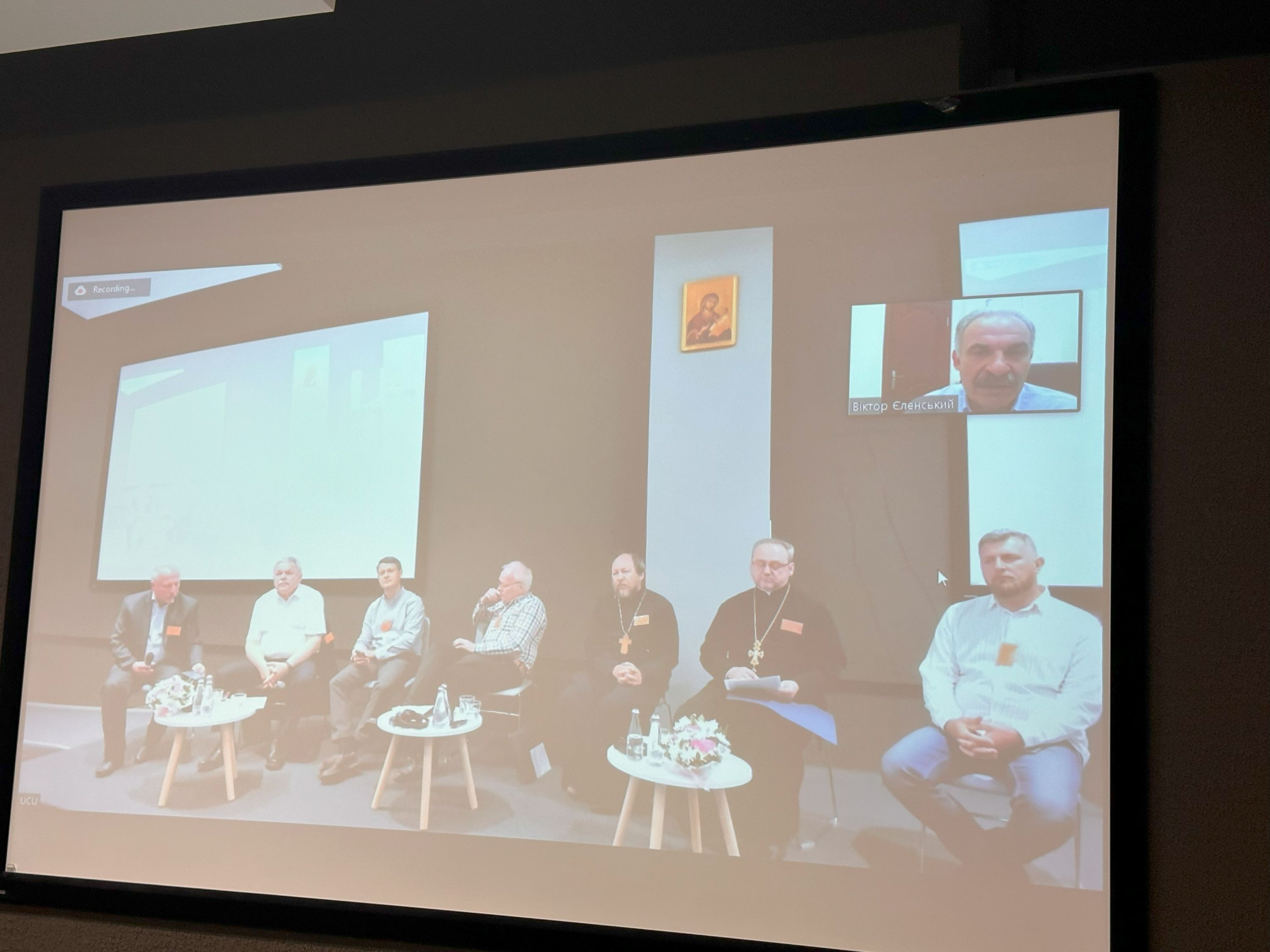
"However, religious diversity does not necessarily evolve into religious pluralism. Religious leaders and the state need specific efforts for pluralism to emerge from diversity. All attempts to undermine religious freedom in Ukraine, especially the memorable ones during the administration of Viktor Yanukovych, failed. Despite Yanukovych's control over the parliament and the near destruction of the judicial branch of power and political opposition, he stopped short of interfering with the peculiarities of religious culture in Ukraine, which had much deeper and stronger roots than the political culture," he points out.
In 2014, when Russia initiated its war against Ukraine, the religious front posed a significant threat, even amid serious challenges in defense, the economy, and other sectors. The new leadership that came to power after the Revolution of Dignity expanded the scope of religious freedom. During this time, the struggle for the recognition of the autocephaly of the Ukrainian Church and the receipt of the Tomos began. This opened alternatives for Ukrainian Orthodoxy.
Dr. Yelensky adds:
"It is essential that Ukrainian society has demonstrated over the last decade that it not only values religious freedom (as evidenced by annual surveys by the Razumkov Center) but also has learned to defend it. Even the slightest hints of the emergence of a state church or church with a special status have been met with polite but firm resistance from religious circles in Ukraine."
Viktor Yelensky compares the activities of the UOC-MP to a corporation, the leadership of which, since 2014, has chosen the wrong side of the confrontation and refused to honor Ukrainian soldiers. This organization has been spreading anti-Ukrainian narratives for years, directed against our statehood, identity, culture, language, and more. The issue here is not just about dozens of collaborators to whom suspicion has been expressed but about the subversive activities of the entire "corporation."
"Under these circumstances, the state turned to the Ukrainian Parliament with a request to consider a bill stating that the activities of religious organizations whose centers are located in a country that is aggressing against Ukraine (i.e., in Russia) are impossible in Ukraine.
Suppose they refuse to sever ties with the Church, which has actively participated in the aggression against Ukraine. In that case, the State Service of Ukraine for Ethnic Policy and Freedom of Conscience has the right to appeal to the court. The court will have the final word. This is a democratic procedure and a standard step the country takes to safeguard itself."
This year, during a meeting with the Chairman of the Verkhovna Rada, the All-Ukrainian Council of Churches and Religious Organizations adopted a resolution stating that it deems it impossible to tolerate any organization in Ukraine (religious or secular) whose center is located in a country that is aggressing against Ukraine. Everyone who commits a crime must be held accountable regardless of whether they wear a cassock. The Ukrainian state aims to sever the ties of religious institutions with centers in Russia and does not want the aggressor to have a channel for activity on religious grounds," concludes the head of the State Service for Ethnic Policy and Freedom of Conscience.
Pastor and independent researcher, formerly a professor at UCU, Mykhailo Cherenkov, has been working in North America for five years. The United States consistently and continuously monitors the level of religious freedom worldwide. However, this does not mean Americans do not believe in certain stereotypes.
"They don't quite understand what sets Ukraine apart from neighboring countries, including its models of religious freedom, even though Ukraine has demonstrated and preserved a unique model of religious freedom since 1991. Americans also believe they know a lot about authentic Orthodox spirituality, which they consider genuine, in contrast to the spiritual decline of the West, which they believe is supposedly suppressed in Ukraine. And these two myths work against our state," notes Dr. Cherenkov.
Ukraine had unprecedented religious freedom and was a global leader in this regard. However, sometimes this leads to anarchy, which is one risk. But another risk is state control of religion. Mykhailo Cherenkov is convinced that Ukraine has found the right path to avoid these extremes.
"For Protestants, and as a representative of the Baptist tradition, religious freedom is a key value. Combining religious freedom, personal relationship with God, and active mission is crucial. That's why we have long recognized the fake religiosity and churchmanship presented by the Moscow Patriarchate. A Church denying other denominations and Churches their freedom and right to exist cannot be genuine. A Church that denies the personal dimension of faith, religiosity, and churchmanship cannot be genuine. A Church that preserves its canonical status to the point of denying the right of existence and missionary activity of other Churches cannot be genuine either. Therefore, we understood this represents a fake type of churchmanship and religiosity. For us, the question remains: how to preserve the spiritual security of our society from fake and aggressive manifestations of religiosity that deny the right of existence to other Churches and religions and that undermine the spiritual foundations of our society and religious freedom, which is the cornerstone for all other freedoms in our country?" adds Cherenkov.
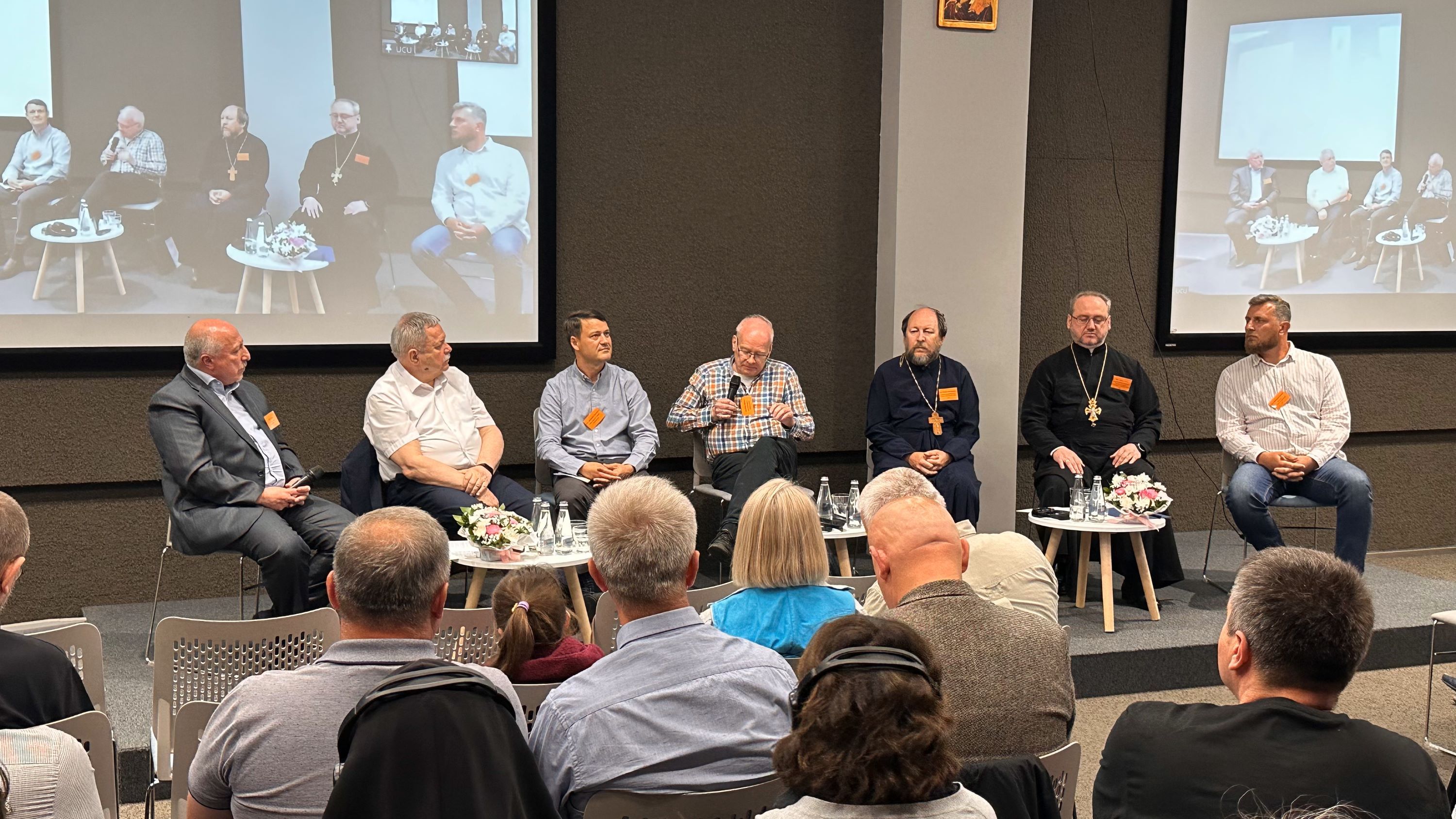
The representative from Germany, independent researcher Christian Weise, points out that the religious situation in Ukraine is quite distant and poorly understood by Germans. For them, discussing religious freedom and national security in the same context seems outdated, more fitting for the 17th or 18th century rather than the present.
"For 30 years, discussions about church diplomacy have been ongoing. In Germany, this topic is already quite remote for us. We do not fully comprehend conflicts on religious grounds nor why many Ukrainians speak Russian.
Unfortunately, the overall discussion is not taking an intriguing path, as other philosophical and theological topics can be discussed beyond security, freedom, and the like. However, within Orthodoxy, these topics remain relatively closed," says Weise.
Despite facing Russian aggression, the question of freedom remains crucial for Ukraine. The future lies with a free world and democracies. The litmus test of democracy is religious freedom. Unlike democracy, religious freedom can be studied, researched, and its level can be determined. This is the belief of Fr. Oleksa Petriv, Head of the Department of External Relations of the Ukrainian Greek Catholic Church.
"UGCC knows what lack of freedom is. Therefore, all its actions since coming out of the underground aim to strengthen a high level of religious freedom. Ukrainian law is recognized as very democratic, meeting the highest criteria of religious freedom. When navigating between Scylla and Charybdis, a wise saying comes in handy: if you don't know what to do, act according to the law. There is no possibility under the law to liquidate an entire Church because it is not a legal entity. But a religious organization can be," says Fr. Oleksa.
The activities of the All-Ukrainian Council of Churches and Religious Organizations are a significant part of public diplomacy. As a civil, non-church association, the Council represents civil society and speaks on its behalf. Its members have no political ambitions and do not seek electoral gains. Therefore, according to Fr. Oleksa, it is the authentic voice of civil society that the world pays attention to.
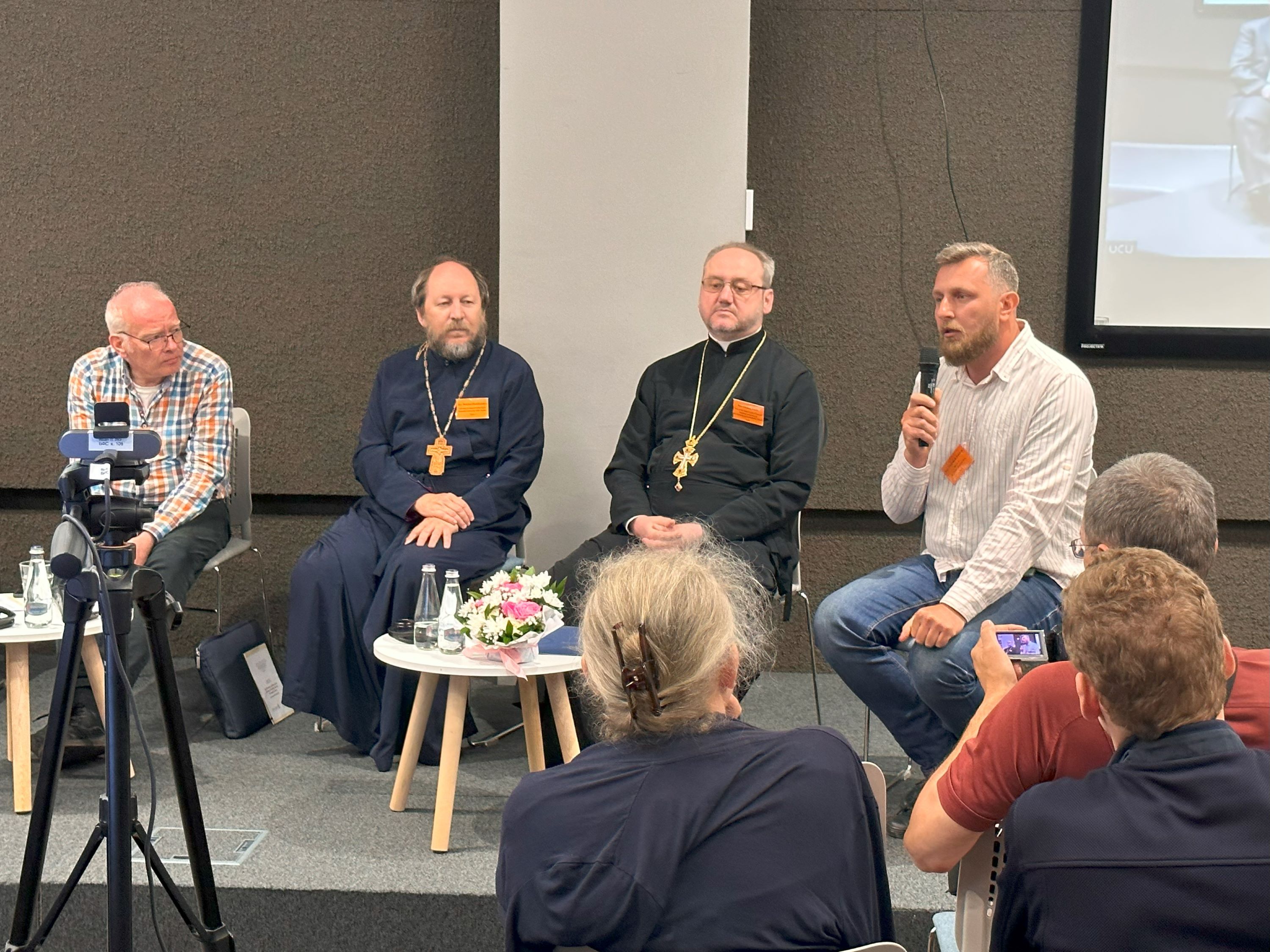
Among the invitees, Fr. Oleksandr Sorokin, a priest of the Ukrainian Orthodox Church of the Moscow Patriarchate (UOC MP) and the director of the charitable foundation "Favor," had the opportunity to express his position. He hails from Kherson and served in Avdiivka in Donbas for nine years. Since 2015, he has been residing in Kyiv with his family and is a cleric of the Kyiv Eparchy of the UOC MP.
"I have the honor of being one of the four hundred priests who, in March 2023, signed an appeal to the Pentarchy regarding the trial of Patriarch Kirill for the heresy of the 'Russian world,' which he promotes worldwide. I am also one of the signatories of ten questions to Metropolitan Onufriy regarding the statute, status, and future of the UOC. Many patriots are within the ranks of the UOC MP, both among the clergy and the laity. But they face difficulties; they feel tremendous pressure and risk persecution and church repulsion. The position of patriot priests is similar to the lines of Ivan Franko: we must 'strike this rock' from both the outside and the inside to create a crack so that Ukrainian Orthodoxy can be unified in understanding and cooperation," said Fr. Oleksandr.
According to him, so far, nothing positive is happening. The leadership of the UOC MP has limited itself to complete silence regarding the course of the war. However, it is not the time to give up, as the Church is not just the clergy but also the believers.
"Last year, I came to a parish where they were commemorating Patriarch Kirill during the full-scale invasion. They stopped doing it in my presence. Then they added a prayer for the Ukrainian military, for Ukraine, for victory. People perceive this positively and understand everything. The priest before me was afraid to change something because it had been that way 'since immemorial.' But the end of the world did not happen. People have eyes and minds. Everyone has a patriotic position when we talk about the situation in Ukraine at the front and outside of the worship.
My view on the situation is this: bans do not solve anything. These are actual living people with whom we can and should work. All collaborators should be brought to court without pardon. But please, allow us to do our work because people hear us, they follow us, and they feel which side is right. Many priests and laity remain silent and are afraid to join our activities openly, but they send us messages saying, 'We are with you!'" shares Fr. Oleksandr's perspective from within.
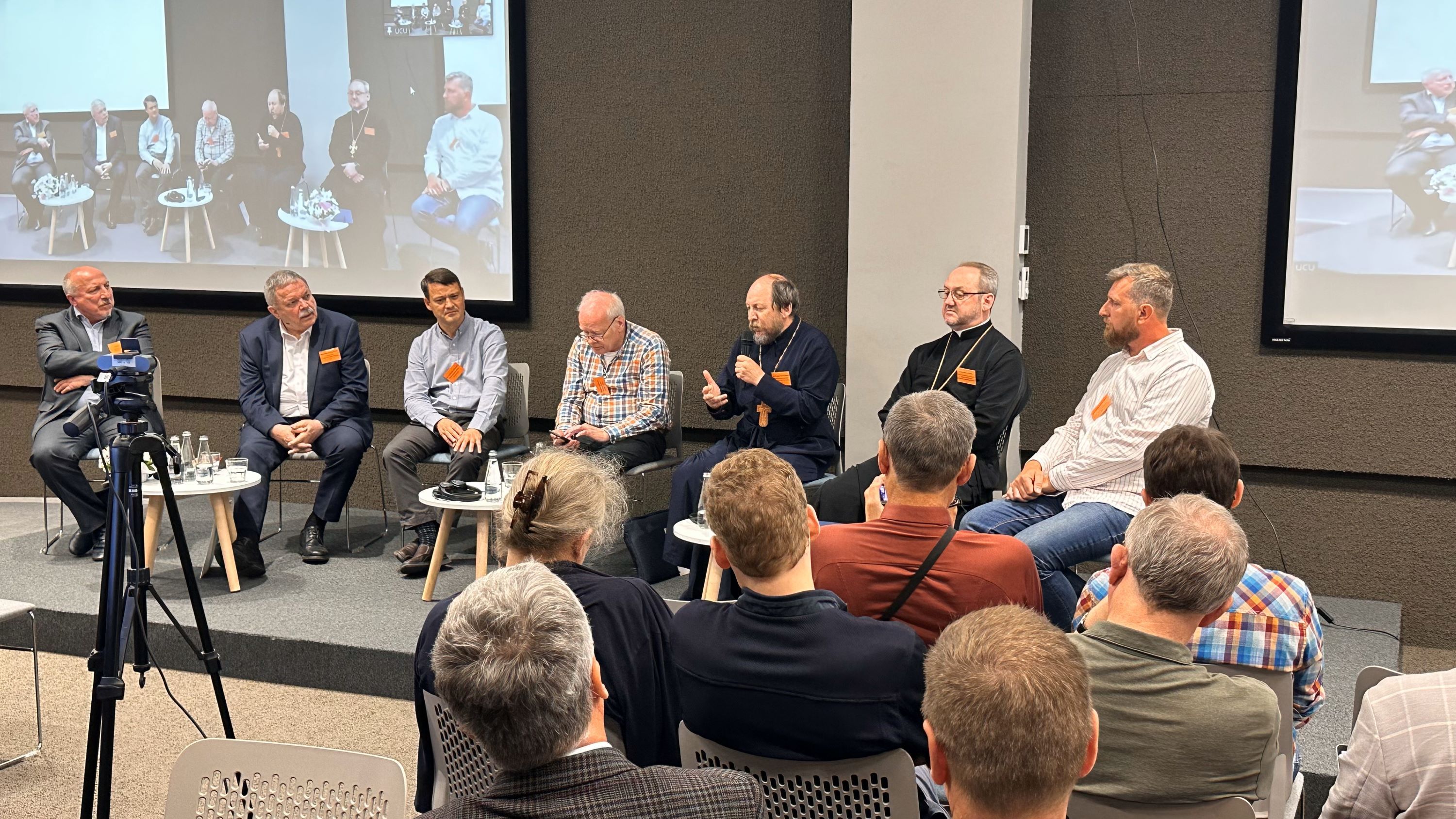
In modern realities, it is important to distinguish between the concepts of tolerance, religious freedom of individuals, and religious freedom of organizations. Archpriest Bohdan Ohulchansky, the scholarly secretary of the Open Orthodox University of St. Sophia, rightly points out that tolerance works wonderfully in Ukraine. For example, within the ranks of the Armed Forces of Ukraine, there are Muslims, Jews, representatives of various denominations, and atheists. Still, they are all Ukrainians and act by the Gospel, showing the highest love by giving themselves to others.
Regarding religious freedom, it is necessary to talk separately about the release of organizations in their activities and the personal liberty of believers.
Some religious structures do not encourage personal religious freedom but seek spiritual authority over their followers. In the church, there is the notion of authority, characteristic of both the Eastern and Western branches. In some cases, this authority, in a historical context, may limit the personal religious freedom of individuals. In other words, there may be religious freedom that allows a religious organization to command its followers, making them march in lockstep. There is a state that loves to march in lockstep - it is the one waging war against us. The religious freedom of an organization is not always indicative of the religious freedom within the organization itself, explains Fr. Bohdan.
Furthermore, freedom is inseparable from responsibility. According to Ukrainian legislation, religious organizations pay for communal services at minimal tariffs, and the state does not interfere in their financial affairs. However, there are gaps in the legal aspect, as such conditions create opportunities for the illegal enrichment of clergy members. Another aspect is priests cannot defend their rights as workers because they are not part of trade unions.
For instance, why doesn't the state regulate these relationships? Where is the freedom of a priest if he does not have the right to defend his professional activity? The lack of financial transparency in churches is also a matter of abuse of power rather than freedom. If the faithful do not know where the funds are going if the hierarchs do not report, and if there is no financial transparency, can this be considered a sign of religious freedom?
Now, let's talk about national security. If a religious organization is exclusive and labels everyone else as heretics, isn't that language of hostility? Is this an indication of religious freedom? If our neighboring country decides to engage in warfare, and its representatives in Ukraine remain silent, is that a sign of religious freedom? We need to differentiate what constitutes religious activity and what does not. Many believers within the Ukrainian Orthodox Church of the Moscow Patriarchate (UOC-MP) existed in information bubbles created when Kirill became patriarch or even earlier. We see how non-religious propaganda has been propagated and its tremendous ongoing impact. Can we allow religious freedom that may harm national security?" asks Fr. Bohdan Ohulchansky.
Ukrainian society will have to ponder this question.
English translation by Iryna Stegniy
##DONATE_TEXT_BLOCK##









